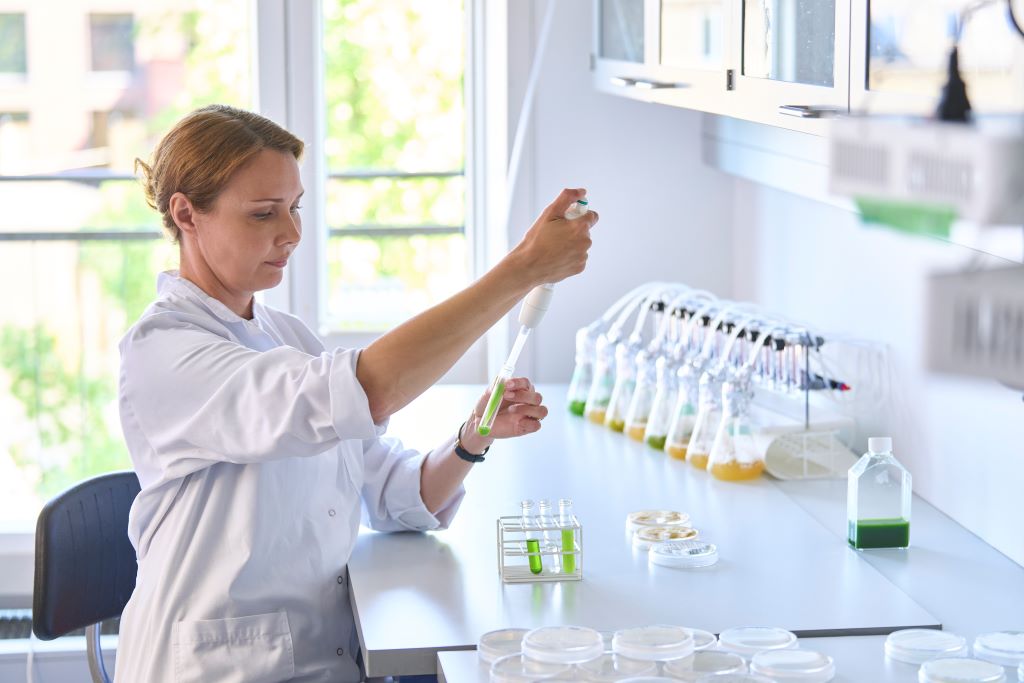The world needs solutions to a wide range of sustainability issues, and the biotech industry needs candidates that can provide those solutions. That is why the University of Copenhagen has created the new Master of Science (MSc) programme in Biosolutions and located it in Scandinavia’s new biotechnology powerhouse of Kalundborg. Being right next to world-leading biotech companies, students will have access to professional networks, collaboration opportunities, and ample job prospects – all of which are great for anyone seeking a headstart into this field as they earn their MSc.
The MSc in Biosolutions, the first of its kind, will set you up to seize the growing job opportunities in the field. It is new and jointly offered by the Department of Plant and Environmental Sciences and Department of Food Science. Together with the biotech industry leaders, it provides an interdisciplinary education that fosters both deep knowledge, an innovative mindset, and ample job opportunities.

With 5,000 researchers and 36,500 students, the university’s international research and study environment consistently ranks it among the top universities worldwide. Source: University of Copenhagen
Turning science into solutions
The MSc in Biosolutions is the only programme of its kind that merges biology and technology. You’ll apply current and new technologies to biological materials and address real-world challenges in agriculture, industrial production, food systems, and environmental protection.
“People who really want to make a positive change should choose Biosolutions,” says Professor Serafim Bakalis, a lecturer in dairy product technology. “We have many problems regarding sustainability, and for this, we don’t need theory; we need solutions.”
The MSc in Biosolutions is a two-year programme. In the first year, you’ll develop the foundation needed to work on bio-based solutions in industrial contexts and study data analysis to enhance bio-based production and design new products. As you move into the second year, you can choose from elective courses, with topics such as sustainable production, regulation and legislation, quality control, and project management.
“Our vision is to expand our educational offerings and continue to build and utilise our strong connections with industry partners, providing students with access to the most current research, ensuring their skills remain highly relevant, and can be set into direct use in current and future companies” says Associate Professor Kirsten Jørgensen Head of Study.
“Likewise, courses in project management and regulations help students navigate the professional landscape with confidence. And, located next to Scandinavia’s largest biotech cluster in Kalundborg, our programme is uniquely positioned to encourage collaboration across disciplines and with the industry, giving students a head start in the biosolutions sector.”

Based in Denmark’s emerging biotech hub, the MSc in Biosolutions provides ample opportunities for students to engage with leading companies like Novo Nordisk and Novonesis. Source: University of Copenhagen
Hands-on learning meets real-world biotech innovation
What truly sets the MSc in Biosolutions programme apart is its links with the biotech industry. “Our industry partners played a big role in the programme’s development. They’ve expressed the need for the specific skillsets that we’re now teaching our students,” says Professor Bakalis.
Leading companies actively engage with students, holding guest lectures that share real-world production insights and organising site visits that connect theory with practical application. “We take full advantage of the close proximity for the students’ benefit,” he says. “We organise many site visits where students can observe large-scale industrial processes firsthand, an experience that a traditional university campus, no matter how well-equipped, simply cannot provide. The scale of process equipment at Novo Nordisk, for instance, is something we cannot replicate on our campus. This means students can see exactly what they will be working with as they study, and through student jobs throughout their studies.”
Another example is CP Kelco, a nature-based ingredient solutions company that extracts pectin from citrus peels. The company assigns students real-world topics and tasks, allowing them to work directly on industry challenges. This hands-on approach, Jørn Stryger, Plant Director at CP Kelco, notes, helps students transition more smoothly into the workforce after graduation.
“The students not only visit the established companies, but get acquainted with start up companies to foster their innovative mindset,” says Jørgensen.
“It is crucial to have a clear overview of the courses, industry contributions, and, most importantly, ensure that the education remains research-based,” says Professor Jørgensen. “Throughout the curriculum, students are offered various project options, allowing them to choose the format that best suits their interests and career goals.”
As a result of this well-designed curriculum, you’re set to build a strong start to your career. Countries worldwide are setting targets to foster sustainability for future generations. Denmark’s Climate Act, for example, aims to reduce the country’s reducing gas emissions by 70% in 2030 (compared to 1990) and achieve climate neutrality by 2050.
With a degree from the University of Copenhagen, you’re signalling to companies and governments that you have the competence to equip students to confront today’s climate challenges head-on. Founded in 1479, the University of Copenhagen is Denmark’s oldest university and is ranked as the fifth best university in Europe. It is a world-class public research institution committed to generating new knowledge, informing the public, and contributing to welfare, prosperity, and a sustainable society.
MSc in Biosolutions graduates benefit from the university’s centuries of experience. It has a broad alumni network, both university-wide and departmental. These connections, coupled with your specialised expertise and the growing demand for biotech-expertise, will make you highly sought-after by food, ingredients, probiotics, bio-based chemical manufacturers and more. You’ll be ready to contribute to developing sustainable and innovative solutions that address global challenges.
Follow the University of Copenhagen on Facebook, LinkedIn, Instagram, X, and YouTube.













